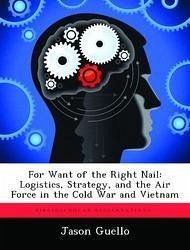This thesis presents an initial attempt to analyze the relationship between strategy and logistics. History, theory, and practice have all shown that linking logistics and strategy is not an easy task, and yet the consequences of discounting this relationship have been and will continue to be severe. Assessing the logistical problems associated with the initial buildup of the Vietnam War, and then linking them to decisions made at the operational and strategic level of war suggests some important insights about the relationship. This is a timeless problem that spans all services and levels of war; one that in the end may be an unavoidable product of the interplay between organizations, governments, and personalities, all of which assume they know what is best for the nation as well as their respected service. When the United States initiated major combat operations in Vietnam, the Air Force found itself unprepared to conduct and support long-term conventional operations. By focusing on strategic bombing in the years leading up to direct American intervention, the USAF intentionally neglected other more conventional capabilities and all the services suffered operationally due to this strategic focus. And yet, can it be any other way? In a system of limited resources, it is impossible to be ready for every conceivable situation involving global security. If a strategy is flexible enough to respond to every possible situation, will it be strong enough to prevail in the situation at hand?
Hinweis: Dieser Artikel kann nur an eine deutsche Lieferadresse ausgeliefert werden.
Hinweis: Dieser Artikel kann nur an eine deutsche Lieferadresse ausgeliefert werden.








